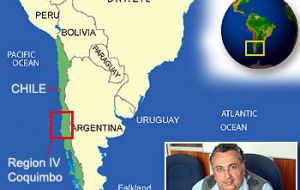MercoPress. South Atlantic News Agency
Chile's first fish farming park to be built in Tongoy
 The project will foment development through establishing aquaculture ventures in Coquimbo waters, according to director J.C. Uribe.
The project will foment development through establishing aquaculture ventures in Coquimbo waters, according to director J.C. Uribe. The University of Los Lagos (ULA) is planning to build the first Fish Farming Park in Chile on a 5.5-hectare terrain, in the Tongoy Bay of Coquimbo Region IV, investing more than CLP 450 million (USD 826.400).
By way of the Smolt Project, the ULA Department of Aquaculture and Aquatic Resources won the tender called 'Great Territories, New Opportunities-Puerto Aldea Fish Farming Project.' "This project is aimed at exploiting the waters of the Tongoy Bay, to foment a development park having a group of fish farming companies established. The ULA is important for this project for its innovative diversification proposal towardsproduction of various species, through a targeted, rational, transparent, and efficient management of the fiscal patrimony of the area," a ULA press release indicates. The iniciative will be carried out in five different stages, including the productive and infrastructure processes, securing corresponding permits, with two years of processing and three more years for the execution of the investment. According to the director of the Department of Aquaculture, Juan Carlos Uribe, "besides the investment itself, it is important to highlight the value of the proposal made by Smolt Project , which seeks to meet the need to develop aquaculture in Region IV, fostering new species through farming, as it ocurred in Region X, where the ULA has been present for more than 30 years." The main purpose of the construction of the first Fish Farming Park in Chile is to produce and export more than 1 millon specimens per year of live and fresh-refrigerated products to the markets of Latin America, Europe, the United States, and Asia. "ULAs present trade channels for salmon will therefore be exploited to their maximum capacity," Uribe added. (FIS)




Top Comments
Disclaimer & comment rulesCommenting for this story is now closed.
If you have a Facebook account, become a fan and comment on our Facebook Page!